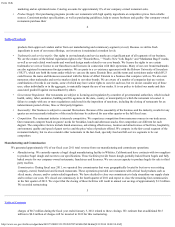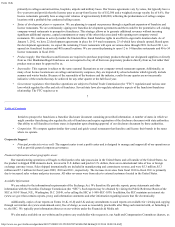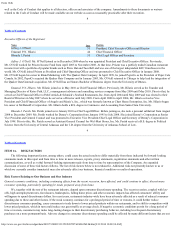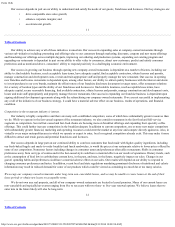Einstein Bros 2011 Annual Report Download - page 15
Download and view the complete annual report
Please find page 15 of the 2011 Einstein Bros annual report below. You can navigate through the pages in the report by either clicking on the pages listed below, or by using the keyword search tool below to find specific information within the annual report.
Form 10-K
http://www.sec.gov/Archives/edgar/data/949373/000119312512092597/d260635d10k.htm[9/11/2014 10:08:30 AM]
Section 382 or will significantly increase the likelihood that we will undergo an additional ownership change in the future (which could occur as a
result of transactions involving our stock that are outside of our control). In either event, the occurrence of an additional ownership change would
limit our ability to utilize a portion of our NOL carryforwards that are not currently subject to limitation, and could further limit our ability to
utilize our remaining NOL carryforwards and possibly other tax attributes. Limitations imposed on our ability to use NOL carryforwards and other
tax attributes to offset future taxable income could cause us to pay U.S. federal income taxes earlier than we otherwise would if such limitations
were not in effect, and could cause such NOL carryforwards and other tax attributes to expire unused, in each case reducing or eliminating the
benefit of such NOL carryforwards and other tax attributes to us and adversely affecting our future cash flow. Similar rules and limitations may
apply for state income tax purposes as well.
Failure of our internal controls over financial reporting could harm our business and financial results.
Our management is responsible for establishing and maintaining effective internal control over financial reporting. Internal control over
financial reporting is a process to provide reasonable assurance regarding the reliability of financial reporting for external purposes in accordance
with accounting principles generally accepted in the United States. Because of its inherent limitations, internal control over financial reporting is
not intended to provide absolute assurance that we would prevent or detect a misstatement of our financial statements or fraud. Any failure to
maintain an effective system of internal control over financial reporting could limit our ability to report our financial results accurately and timely
or to detect and prevent fraud. A significant financial reporting failure or material weakness in internal control over financial reporting could cause
a loss of investor confidence and decline in the market price of our stock.
Risk Factors Relating to Our Common Stock
We have a majority stockholder and are a “controlled company”.
Greenlight Capital, L.L.C. and its affiliates (“Greenlight”) beneficially own approximately 64% of our common stock as of January 3, 2012.
As a result, Greenlight has sufficient voting power, without the vote of any other stockholders, to determine what matters will be submitted for
approval by our stockholders to elect all of the members of our board of directors, and to determine whether a change in control of the Company
occurs. Greenlight’ s interests on matters submitted to stockholders may be different from those of other stockholders. Greenlight has voted its
shares to elect our current board of directors, and the chairman of our board of directors was an employee of Greenlight until February 2011, when
he retired from Greenlight.
We have listed our common stock on the NASDAQ Global Market. NASDAQ rules require us to have an audit committee consisting entirely
of independent directors. However, under NASDAQ rules, if a single stockholder holds more than 50% of the voting power of a listed company,
that company is considered a “controlled company”, and is exempt from several other corporate governance rules, including the requirement that
companies have a majority of independent directors and independent director involvement in the selection of director nominees and in the
determination of executive compensation. As a result, our stockholders do not have, and may never have, the protections that these rules are
intended to provide. We currently have a majority of independent directors on the board of directors and an audit committee and a compensation
committee that each consist entirely of independent directors. We do not have a nominating committee; however, all directors participate in the
consideration of director nominees.
Future sales of shares of our common stock by our stockholders could cause our stock price to fall.
If a substantial number of shares of our common stock are sold in the public market, the market price of our common stock could fall. The
perception among investors that these sales will occur could also produce this effect. Sales of our common stock by our majority stockholder,
Greenlight, or a perception that Greenlight will sell their shares could cause a decrease in the market price of our common stock.
18
Table of Contents
ITEM 1B. UNRESOLVED STAFF COMMENTS
None
ITEM 2. PROPERTIES
Our Properties
Our headquarters, manufacturing and commissary facilities and all of our restaurants are located on leased premises. Lease terms are usually 5
to 10 years, with two or three 5-year renewal option periods, for total lease terms that average 10 to 20 years. The average company-owned
restaurant is 1,800 to 2,500 square feet in size with 30 to 40 seats and is generally located in a neighborhood or regional shopping center. As of
January 3, 2012, leases for 56 restaurants are set to expire within the next 12 months and most of these leases contain a renewal option, usually
with modified pricing terms to reflect current market rents. We expect to close six to ten company-owned restaurants over the next three years as
























